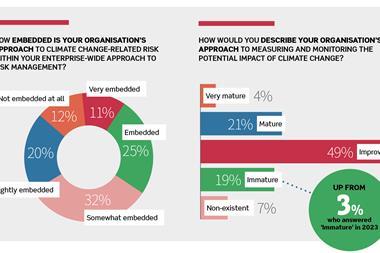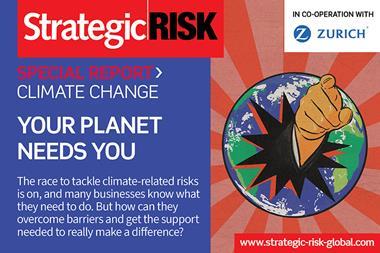There is huge pressure for companies to present an environmentally friendly image but consumers, regulators and law courts are now quick to silence greenwashing. So, if you plan to shout about your green credentials, make sure you have the data to back up your claims.
This article is part of our Climate Change research and special report. You can access the full report, including the results of this year’s research and case studies from risk managers that are leading the charge here.
“I’m worried about greenwashing,” said John Elkington, one of the world’s leading authorities on corporate responsibility and sustainable development in a 2008 interview.

“I think we should come down on it very, very hard, whether it’s with criminal intent or actively deceptive.”
Sixteen years on, Elkington’s concerns about greenwashing — that is, providing false or misleading information about how environmentally sound a company’s products are – have proven somewhat prophetical.
In a Harris Poll, some 68% of US executives said their companies are guilty of greenwashing, while two-thirds of global executives questioned if their company’s sustainability efforts were genuine.
The number of instances of greenwashing by banks and financial services firms around the world jumped 70% last year, according to research by ESG data firm RepRisk.
Now, this issue has caught the attention of regulators, who in turn have started to respond.
“Overselling sustainability credentials risks losing customers as well as the reputational damage that will follow,”
In January, the European Parliament formally endorsed the Greenwashing Directive. It aims to ensure reliable sustainability information about products and companies and clamps down on misleading advertising and the misuse of sustainability labels.
In Korea, a recently introduced greenwashing law sees firms receive fines up to $2,200 if they are found to be deceiving the public about their green credentials.
And it’s not just fines companies need to fear. Reputations are at stake, and that can hit profits. Over half (54%) of consumers said they would stop buying from a company if they were found to have been misleading in their sustainability claims, according to KPMG UK research.
“Companies keen to capitalise on the growing interest in sustainable products should be taking a measured approach — overselling sustainability credentials risks losing customers as well as the reputational damage that will follow,” says Richard Andrews, head of ESG at KPMG, UK.
“While this might often be unintentional, understanding the data behind any sustainability claim is key, as well as ensuring that data has also been verified, if brands are serious about avoiding any greenwashing risks.”
SEE YOU IN COURT
Jonathan White, a lawyer for accountable corporations at ClientEarth, says legal action related to greenwashing is largely focused on fossil fuels – either claims about fossil fuels directly, such as “carbon-neutral LNG”, or claims relating to the production or use of fossil fuels.
“This stretches from regulatory complaints about fashion businesses making green claims at odds with the coal power used to make their products, to court judgments regarding fossil-fuelled aviation,” says White.
“[Another example is a] criminal investigation into an oil and gas company claiming to be aiming for net zero by 2050, despite expanding fossil fuel production.”
“When advertising is not straightforwardly false, the common issue is that it gives a misleading impression, even if it is literally true. For example, exaggerating the minor use of biofuels or investments in renewable energy operations, while these are unrepresentative of much larger fossil fuel-linked business activities.”
White says there is a rising trend in greenwashing legal actions targeting industrial meat and dairy production, which are among the most emissionsintensive sectors. These industries are particularly vulnerable to accusations of misleading green claims.
“There are various consequences of legal action under these laws and regulations”
For example, the New York Attorney-General has brought a claim against the beef giant JBS, alleging that the company excluded the vast majority of its business’ greenhouse gas emissions from its environmental commitment, which it then promoted in advertising and marketing.
“There are laws and regulations in our societies that safeguard consumers, investors and the general public from misleading market conduct and aim to ensure truth in commerce,” says White.
“There are various consequences of legal action under these laws and regulations, from a self-regulatory body’s recommendation to withdraw the advert in question, to court orders to cease advertising, publicly rectify misleading claims and pay damages to misled consumers or investors.”
Where greenwashing forms part of an industry strategy to delay or subvert transitions – for example, to maintain demand for fossil fuels products instead of alternatives – this raises greater risks of lawsuits for climate damages and regulatory or criminal investigations, White adds.
“Companies are also hurt by greenwashing because when one seeks to bring a genuinely more sustainable alternative to market, they do not face a level playing field.”
HOW CAN YOU AVOID GREENWASHING?
For risk managers, the threat of greenwashing can sprout from overly eager marketing departments or a C-suite keen to flex green credentials beyond their real-world strength.
However, false green boasts can lift red flags with regulators and customers, alike. White says claims must be substantiated against the environmental evidence, and too often claims are poorly understood by the businesses making them.
“The threat of greenwashing can sprout from overly eager marketing departments”
“There is a need for companies to map and understand the environmental impact of their products and businesses, and to understand the pathways for their sector to stay within international goals. Once they do so, ensuring that claims faithfully represent the evidence, and do not mislead by omission, is no different from any other type of marketing claim or investor statement.
“This does mean that highly polluting industries with insufficient plans will struggle to put out environmental claims that give a positive impression, but this leaves the space open for companies with a better evidential basis to compete for consumer demand and investment.”
This article is part of our Climate Change research and special report. You can access the full report, including the results of this year’s research and case studies from risk managers that are leading the charge here.














No comments yet